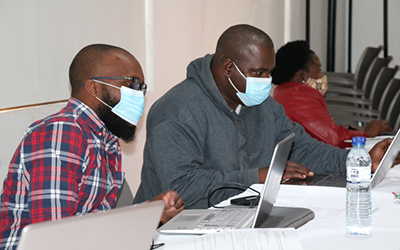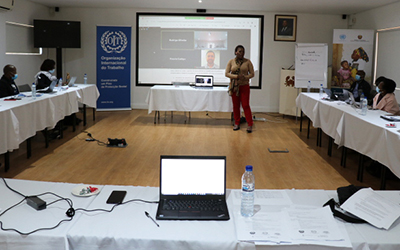Blog
Working together to better understand how COVID-19 affects poverty and inequality
In summer 2020 the SOUTHMOD team set out, with partners, to analyse the impact of government policies on protecting households from getting poorer and avoiding societies from becoming more unequal. Now we are releasing a cross-country comparative study that analyses the distributional effects of the COVID-19 pandemic and related tax-benefit measures in 2020 in five African countries.
The COVID-19 pandemic has caused major disruptions around the globe, and new evidence keeps emerging on its impact on all aspects of life. Our study explores the distributional effects of the policy measure in Ghana, Mozambique, Tanzania, Uganda, and Zambia. Similar analyses are ongoing for Viet Nam and have been conducted for Ecuador and South Africa.
There is a severe lack of up-to-date data on how households were affected by the pandemic
In all of these countries we find limited tax-benefit policies stabilizing power, particularly in regard to automatic stabilizers — the automatic changes in tax-benefit policies due to the shock; for example, decreases in tax payments as a result of decrease in earnings.
The two biggest challenges encountered during this vast project have been the difficulty in obtaining relevant information on policies enacted in response to the COVID-19 pandemic, and the lack of up-to-date data on how households were affected by the pandemic.
Getting it right by working hand-in-hand with national partners
Many governments in developing countries reacted to the COVID-19 crisis by bumping up social protection schemes and reducing tax payments by households. There is plenty of media coverage on the various policy measures considered and implemented by different governments. This information however typically lacks official sources and details such as which households were eligible for a certain benefit or tax waiver and how large the additional benefit payments were.
Most governments do not communicate such information through dedicated webpages. In many countries, the financing of social protection schemes also hinges on donors, affecting whether and if a particular benefit scheme can be rolled out.
The SOUTHMOD national teams in each country thus set out on a quest to uncover the official information and check the necessary details on the various policy measures adopted. The teams followed up with counterparts in relevant ministries so that the whole group could together decide how a specific policy could be modelled.

In Mozambique, for example, the information was provided by the MOZMOD national team, based at the Ministry of Economics and Finance. The information was collected in a 5-day modelling retreat for government officials, co-organized with ILO.
At the retreat, the team also sat down with participants from the Ministry of Economic and Finance (MEF) and National Institute of Social Action (INAS) and discussed the implementation of additional social protection measures. Bringing experts together to the (virtual) table allowed us to gather, for example, critical information on the Post-Emergency Direct Social Support Programme, such as the number of beneficiaries and final disbursement timetable.
Making the most of the scarce data available
Our analysis required information on how household incomes suffered due to the COVID-19 crisis in 2020. The SOUTHMOD models are based on detailed survey data that include information on which household member earned how much income in which sector of the economy, along with any other income received by the household. However, these data were collected well before the COVID-19 pandemic hit.
For the countries we analyse, no such data has been released nor collected for 2020, and for good reasons. Such surveys are very expensive and even in normal times conducted only every few years. The surveys typically also involve face-to-face visits to households by enumerators, which was impossible to in the initial stages of the pandemic.

Thus we had to do without up-to-date individual-level data on households’ income sources. A second-best option is phone surveys, including those conducted by the World Bank. Implemented in each country independently, these surveys aim to capture, amongst other things, variations in household income and job loss related to COVID-19. For the countries studied in this project, we had access to the data for Uganda only. This data, while not offering details on exact income losses, provided us with useful information on how incomes had developed throughout 2020.
For most of our work so far, we have had to resort to approximating income losses by deviations in 2020 GDP from pre-COVID GDP trends in each sector of the economy. While we hope that more data will become available in due course, this approach reflects how each sector of the economy was affected differently.
Understanding the impact of COVID-19 will stay a key question for our work
This project aims to provide evidence on the implications of the COVID-19 pandemic in 2020 for several African countries. The pandemic and its impacts, however, will stay with us beyond 2020.
Going forward, governments will require further evidence on the economic impact of the crisis and the effectiveness of government policies in protecting vulnerable populations. In ongoing work in the SOUTHMOD project, we will continue to assess how policies develop in 2021 and beyond, incorporating more and better data as they become available.
Together with our partners, we will continue to provide evidence for African governments to aid the design of effective, remedial tax-benefit policies.
The views expressed in this piece are those of the authors, and do not necessarily reflect the views of the Institute or the United Nations University, nor the programme/project donors.
 Join the network
Join the network












